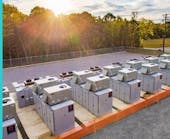Smartville Receives $10M from DOE for Long-Duration, Second-Life Energy Storage Projects
As part of its $325 million investment to develop long-duration energy storage (LDES) technologies, the U.S. Department of Energy (DOE) Office of Clean Energy Demonstrations (OCED) has awarded $10 million to Smartville.
Smartville will lead one of 15 projects to provide real-world benefits to local power systems, mitigate risks associated with disruptions to the grid, and help communities develop reliable and affordable energy systems.
The company will install its Smartville 360 energy storage system (ESS) in six locations across four states. The systems utilize repurposed EV battery packs sourced domestically in the U.S.; in total, more than 7 MWh of battery capacity will be installed.
The systems will provide grid resiliency and backup power while helping to reduce energy costs for:
- Senior centers
- Low-income multi-family affordable housing complexes
- EV charging facilities
Installation will take place in several major cities, including San Diego, Atlanta, and New Orleans.
Smartville also received support from the HBCU Community Development Action Coalition (CDAC) and four Historically Black Colleges and Universities (HBCUs) to develop the proposed projects. The four supporting universities include:
- Denmark Technical College
- Claflin University
- South Carolina State University
- Dillard University
"This LDES project builds on previous outcomes from CDAC's work in successfully aggregating and partnering with HBCUs, including those presented in Smartville's application,” said Henry Golatt, Chief of Strategy and Partnerships for CDAC. “This project advances the work CDAC is doing alongside private developer Luna Development Services and Renaissance Equity Partners in Orangeburg and also expands CDAC's efforts to other HBCUs, including Denmark Technical College and Dillard University."
According to Dr. Willie Todd, President of Denmark Technical College, the project will allow the institutions to add industry-specific career and technical training, as well as project and partner-specific workforce development opportunities.
"We hope to create pipelines and pathways to future high-wage-paying careers for STEM and engineering majors while also embracing a 'Communiversity' vision,” said Dr. Rochelle Ford, President of Dillard University.





